Israel Expands 'Security Zones' to Include Rafah, Defense Minister Announces










2025-04-10T20:22:24.000Z

In a significant escalation of military operations, Israel's Defense Minister, Israel Katz, has declared that the southern city of Rafah will now be included in the country's designated 'security zones' in Gaza. This decision was announced during a recent visit to the area, where Katz emphasized the military's objective to leave Gaza 'smaller' and 'more isolated' as a means to exert pressure on Hamas to release hostages currently held by the militant group.
The Israeli military has already implemented a comprehensive land seizure along the entire perimeter of the Palestinian territory, characterizing these areas as buffer zones aimed at preventing any future attacks. The inclusion of Rafah and its nearby surroundingsan area that constitutes nearly one-fifth of Gaza's total landis a direct response to a series of military orders that have led to civilian evacuations and the establishment of new corridors separating residents from the nearby city of Khan Younis.
According to the United Nations, the ongoing conflict has forced around 390,000 Palestinians to flee their homes, representing nearly 20% of Gaza's entire population of 2.1 million. Since Israel resumed its military offensive against Hamas on March 18 following the breakdown of a two-month ceasefire, approximately two-thirds of Gaza has been classified as 'no-go' zones or has been placed under evacuation orders. The dire humanitarian situation in the region has worsened, with the UN warning that supplies of food, medicine, and fuel have been depleted due to Israel's blockade on humanitarian aid deliveries since March 2.
The Israel Defense Forces (IDF) initially launched a ground offensive in Rafahhome to about 280,000 residents prior to the escalation of hostilitiesin May 2024. This operation resulted in extensive destruction throughout the city. Additionally, the IDF has secured a vital strip of land along the border with Egypt, referred to as the 'Philadelphi Corridor,' citing its necessity in preventing weapons smuggling and Hamass rearmament. Following a temporary ceasefire that began in January, approximately 100,000 residents returned to their homes in Rafah after Israeli forces temporarily withdrew into border regions.
On March 31, almost two weeks after the conflict resumed, the IDF issued a sweeping evacuation order that the UN reported encompassed 97% of Rafah and its surrounding governorate, covering 64 square kilometers (25 square miles). Displaced civilians were directed to seek refuge in tent camps located in the al-Mawasi coastal area, previously identified by the IDF as a 'humanitarian zone.' The evacuation led to near-complete abandonment of the Rafah area, which was subsequently highlighted by Israeli Prime Minister Benjamin Netanyahu's announcement of the military's seizure of the Morag Corridora region situated between Rafah and Khan Younis. Netanyahu stated that this new measure would serve to pressure Hamas into releasing the remaining hostages, among which 24 are believed to still be alive.
During his visit to the newly established corridor, Defense Minister Katz met with troops and senior Israeli military commanders, addressing journalists and reiterating the IDF's commitment to dismantling Hamass operational capabilities. 'The IDF is eliminating terrorists, locating and thwarting terrorist infrastructure, and dismembering the Gaza Strip, even in places like the Morag corridor, where we have not operated to date,' Katz asserted in a video released by his office. He further indicated that the evacuation efforts would render Gaza smaller and more isolated, warning that if Hamas does not comply with demands to release the hostages, the IDF would escalate military operations throughout the entirety of Gaza.
In a follow-up remark to an Israeli journalist from Ynet, Katz specified, 'All of Rafah will be evacuated and turned into a security area. This is what we are doing now.' As of Thursday morning, the IDF reported ongoing military operations in Rafah and along the Morag corridor, claiming that several terrorists had been eliminated and terrorist infrastructure sites had been identified and dismantled, all while working to establish operational control in the area.
The destruction in Rafah is substantial, with large sections of the city left in ruins as a result of the IDF's earlier offensives, raising significant concerns regarding the humanitarian impact on the civilian population amidst the ongoing conflict.
 Isabelle Moreau
Isabelle Moreau
Source of the news: www.bbc.com